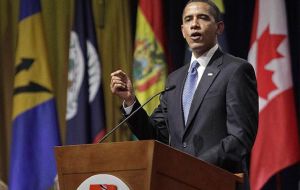MercoPress. South Atlantic News Agency
United States and Latin America
 Pte. Barack Obama during the recent summit in Trinidad Tobago
Pte. Barack Obama during the recent summit in Trinidad Tobago The Economist under the heading “The charming neighbour” says President Barack Obama’s incursion into Latinamerica at the recent summit in Trinidad Tobago was “overall a success”. But is also asks whether the new mood will survive the worsening recession in Latin America is unclear. And is spite all the discussion about Cuba, The Economist believes that in practice, “drugs and security are likely to overshadow all other issues in the Obama administration relation with Latinamerica. Furthermore “trade and immigration”, particularly with Mexico, have become dividing issues.
Follows the full article:
AFTER Europe earlier this month, it was Latin America’s turn to enjoy Barack Obama’s charm offensive. In a brief visit to Mexico City, he assured President Felipe Calderón of his support against Mexico’s drug gangs. He went on to Trinidad for the Summit of the Americas, where he dispensed smiles, handshakes and backslaps, and called for a “new beginning” in the relationship between the two halves of the region. It seemed to work. The prime minister of St Lucia asked Mr Obama for an autograph. Even Hugo Chávez, Venezuela’s anti-American president, was disarmed. He repeatedly shook hands with the leader of the country he calls the “empire”, saying “I want to be your friend”. Seven months ago, he kicked out the American ambassador, a step he now wants to reverse.
How much substance lurks behind the smiles? Latin America wants Cuba to return to the diplomatic concert of the Americas. Mr Obama has allowed Cuban-Americans to travel freely and send money to the island. But reversing his position in his senatorial campaign of 2004, he said he did not favor an immediate lifting of the broader American economic embargo against the island.
In practice, the issues of drugs and security are likely to overshadow all others in the Obama administration’s relations with Latin America. In Mexico City Mr Obama repeated the soothing message already delivered by several of his cabinet members, that America has a “shared responsibility” for Mexico’s security problem because of its demand for drugs and the southbound traffic in guns and cash.
Mr Obama has begun to back up this rhetoric. He has added border agents, ordered inspections of Mexico-bound trains and stepped up efforts to seize the assets north of the border of three Mexican trafficking gangs. Mexican officials are also pleased that the administration is making more of an effort to trace guns.
But some big issues remain unresolved. Under the Mérida Initiative of 2007, the Bush administration promised Mexico $1.4 billion in aid over three years, most of it for helicopters and surveillance and inspection equipment. Congress took nine months to approve the aid; in February it sliced $150m from it. None of the money has yet been paid out. Mr Obama promised to expedite its disbursement, but gave no timetable.
Trade and immigration have also become issues which divide the two countries. Mexico’s government is pleased that Mr Obama has backed away from his campaign promise to renegotiate the North American Free Trade Agreement. But Congress recently cancelled a pilot program allowing Mexican trucks to operate north of the border, prompting Mr Calderón to impose retaliatory tariffs on American goods. “We need to fix the trucking provision,” Mr Obama said in Mexico City, but gave no indication of when or how. While he has declared his commitment to immigration reform, his administration has not agreed to a request from Mexico not to separate families by deporting those of their members who lack documents.
Overall Mr Obama’s trip was a success. Several Latin American governments complained that the summit communiqué did not condemn the American embargo against Cuba. But Brazil’s Luiz Inácio Lula da Silva hailed “a new way of viewing each other and of overcoming our differences by debating them”. Whether the new mood will survive the worsening recession in Latin America is unclear. On April 22nd the World Bank, the Inter-American Development Bank and other donors said that they are ready to lend $90 billion to the region over the next two years. It is unlikely to be enough.




Top Comments
Disclaimer & comment rulesCommenting for this story is now closed.
If you have a Facebook account, become a fan and comment on our Facebook Page!